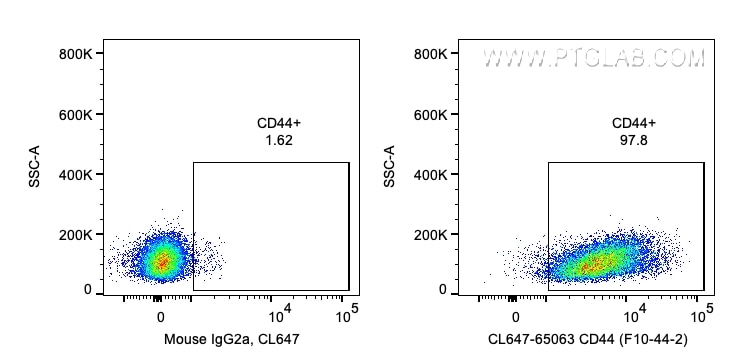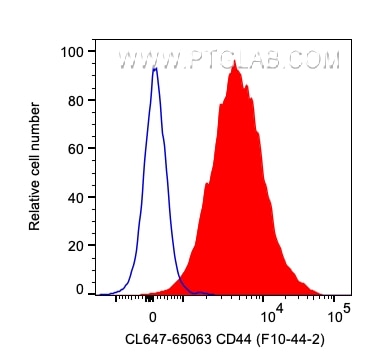CD44 Monoklonaler Antikörper
CD44 Monoklonal Antikörper für FC
Wirt / Isotyp
Maus / IgG2a, kappa
Getestete Reaktivität
human
Anwendung
FC
Konjugation
CoraLite® Plus 647 Fluorescent Dye
CloneNo.
F10-44-2
Kat-Nr. : CL647-65063
Synonyme
Galerie der Validierungsdaten
Geprüfte Anwendungen
| Erfolgreiche Detektion in FC | humane PBMCs |
Empfohlene Verdünnung
| Anwendung | Verdünnung |
|---|---|
| This reagent has been pre-titrated and tested for flow cytometric analysis. The suggested use of this reagent is 5 μl per 10^6 cells in a 100 µl suspension or 5 μl per 100 µl of whole blood. | |
| Sample-dependent, check data in validation data gallery | |
Produktinformation
CL647-65063 bindet in FC CD44 und zeigt Reaktivität mit human
| Getestete Reaktivität | human |
| Wirt / Isotyp | Maus / IgG2a, kappa |
| Klonalität | Monoklonal |
| Typ | Antikörper |
| Immunogen | Gereinigte T-Zellen aus humanen Lymphknoten |
| Vollständiger Name | CD44 molecule (Indian blood group) |
| Berechnetes Molekulargewicht | 742 aa, 82 kDa |
| GenBank-Zugangsnummer | BC004372 |
| Gene symbol | CD44 |
| Gene ID (NCBI) | 960 |
| Konjugation | CoraLite® Plus 647 Fluorescent Dye |
| Excitation/Emission maxima wavelengths | 654 nm / 674 nm |
| Form | Liquid |
| Reinigungsmethode | Affinitätsreinigung |
| Lagerungspuffer | PBS with 0.09% sodium azide and 0.5% BSA. |
| Lagerungsbedingungen | Store at 2-8°C. Avoid exposure to light. Stable for one year after shipment. 20ul Größen enthalten 0,1% BSA. |
Hintergrundinformationen
CD44 is a type I transmembrane glycoprotein expressed on embryonic stem cells and in various levels on other cell types including connective tissues and bone marrow. CD44 expression is also upregulated in subpopulations of cancer cells and is recognized as a molecular marker for cancer stem cells (PMID: 29747682). It is a cell-surface receptor that mediates cell-cell and cell-matrix interactions through its affinity for hyaluronic acid (HA) and possibly also through its affinity for other ligands (PMID: 10694938). Adhesion with HA plays an important role in cell migration, tumor growth and progression. CD44 is also involved in lymphocyte activation, recirculation and homing, and in hematopoiesis.



